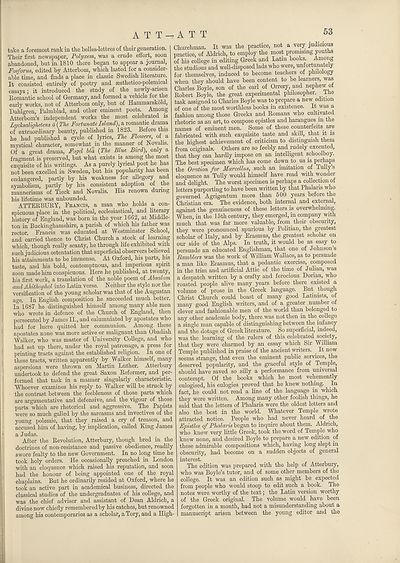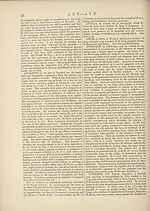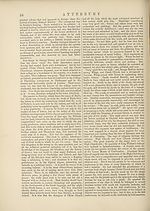Encyclopaedia Britannica > Volume 3, Athens-BOI
(65) Page 53
Download files
Complete book:
Individual page:
Thumbnail gallery: Grid view | List view

53
A T T — A T T
take a foremost rank in the belles-lettres of their generation.
Their first newspaper, Polyxem, was a crude effort, soon
abandoned, but in 1810 there began to appear a journal,
Fosforus, edited by Atterbom, which lasted for a consider¬
able time, and finds a place in classic Swedish literature.
It consisted entirely of poetry and sesthetico-polemical
essays; it introduced the study of the newly-arisen
Romantic school of Germany, and formed a vehicle for the
early works, not of Atterbom only, but of Hammarskold,
Dahlgren, Palmblad, and other eminent poets. Among
Atterbom’s independent works the most celebrated is
Lycksalighetens 6 (The Fortunate Island), a romantic drama
of extraordinary beauty, published in 1823. Before this
he had published a cycle of lyrics, The Flowers, of a
mystical character, somewhatoin the manner of Novalis.
Of a great drama, Fogel hla (The Blue Bird), only a
fragment is preserved, but what exists is among the most
exquisite of his writings. As a purely lyrical poet he has
not been excelled in Sweden, but his popularity has been
endangered, partly by his weakness for allegory and
symbolism, partly by his consistent adoption of the
mannerisms of Tieck and Novalis. His renown during
his lifetime was unbounded.
ATTERBURY, Francis, a man who holds a con¬
spicuous place in the political, ecclesiastical, and literary
history of England, was born in the year 1662, at Middle-
ton in Buckinghamshire, a parish of which his father was
rector. Francis was educated at Westminster School,
and carried thence to Christ Church a stock of. learning
which, though really scanty, he through life exhibited with
such judicious ostentation that superficial observers believed
his attainments to be immense. At Oxford, his parts, his
taste, and his bold, contemptuous, and imperious spirit
soon made him conspicuous. Here he published, at twenty,
his first work, a translation of the noble poem of Absalom
and Ahithophel into Latin verse. Neither the style nor the
versification of the young scholar was that of the Augustan
ao-e. In English composition he succeeded much better.
In 1687 he distinguished himself among many able men
who wrote in defence of the Church of England, then
persecuted by James II., and calumniated by apostates who
had for lucre quitted her communion. Among these
apostates none was more active or malignant than Obadiah
Walker, who was master of University College, and who
had set up there, under the royal patronage, a press for
printing tracts against the established religion. In one of
these tracts, written apparently by Walker himself, many
aspersions were thrown on Martin Luther. Atterbury
undertook to defend the great Saxon Reformer, and per¬
formed that task in a manner singularly characteristic.
Whoever examines his reply to Walker will be struck by
the contrast between the feebleness of those parts which
are argumentative and defensive, and the vigour of those
parts which are rhetorical and aggressive. The Papists
were so much galled by the sarcasms and invectives of the
young polemic, that they raised a cry of treason, and
accused him of having, by implication, called King James
a Judas.
After the Revolution, Atterbury, though bred in the
doctrines of non-resistance and passive obedience, readily
swore fealty to the new Government. In no long time he
took holy orders. He occasionally preached in London
with an eloquence which raised his reputation, and soon
had the honour of being appointed one of the royal
chaplains. But he ordinarily resided at Oxford, where he
took an active part in academical business, directed the
classical studies of the undergraduates of his college, and
was the chief adviser and assistant of Dean Aldrich, a
divine now chiefly remembered by his catches, but renowned
among his contemporaries as a scholar, a Tory, and a High-
Churchman. It was the practice, not a very judicious
practice, of Aldrich, to employ the most promising youths
of his college in editing Greek and Latin books. Among
the studious and well-disposed lads who were, unfortunately
for themselves, induced to become teachers of philology
when they should have been content to be learners, was
Charles Boyle, son of the earl of Orrery, and nephew of
Robert Boyle, the great experimental philosopher, i he
task assigned to Charles Boyle was to prepare a new edition
of one of the most worthless books in existence. It was a
fashion among those Greeks and Romans who cultivated
rhetoric as an art, to compose epistles and harangues in the
names of eminent men. Some of these counterfeits^ are
fabricated with such exquisite taste and skill, that it is
the highest achievement of criticism to distinguish them
from originals. Others are so feebly and rudely executed,
that they can hardly impose on an intelligent schoolboy.
The best specimen which has come down to us is perhaps
the Oration for Marcellas, such an imitation of dully s
eloquence as Tully would himself have read with wonder
and delight. The worst specimen is perhaps a collection of
letters purporting to have been written by that Phalaiis who
governed Agrigentum more than 500 years before the
Christian era. The evidence, both internal and external,
against the genuineness of these letters is overwhelming.
When, in the 15th century, they emerged, in company with
much that was far more valuable, from their obscurity,
they were pronounced spurious by Politian, the greatest
scholar of Italy, and by Erasmus, the greatest scholar on
our side of the Alps. In truth, it would be as easy to
persuade an educated Englishman, that one of Johnson s
Ramblers was the work of William Wallace, as to persuado
a man like Erasmus, that a pedantic exercise, composed
in the trim and artificial Attic of the time of Julian, was
a despatch written by a crafty and ferocious Dorian, who
roasted people alive many years before there existed a
volume of prose in the Greek language. But though
Christ Church could boast of many good Latinists, of
many good English writers, and of a greater number of
clever and fashionable men of the world than belonged to
any other academic body, there was not then in the college
a single man capable of distinguishing between the infancy
and the dotage of Greek literature. So superficial, indeed,
was the learning of the rulers of this celebrated society,
that they were charmed by an essay which Sir William
Temple published in praise of the ancient writers. . It now
seems strange, that even the eminent public services, the
deserved popularity, and the graceful style of Temple,
should have saved so silly a performance from universal
contempt. Of the books which he most vehemently
eulogised, his eulogies proved that he knew nothing. In
fact, he could not read a line of the language in which
they were written. Among many other foolish things, he
said that the letters of Phalaris were the oldest letters and
also the best in the world. Whatever Temple wrote
attracted notice. People who had never heard of the
Epistles of Phalaris began to inquire about them. Aldrich,
who knew very little Greek, took the word of Temple who
knew none, and desired Boyle to prepare a new edition of
these admirable compositions which, having long slept in
obscurity, had become on a sudden objects of general
interest.
The edition was prepared with the help of Atterbury,
who was Boyle’s tutor, and of some other members of the
college. It was an edition such as might be expected
from people who would stoop to edit such a book. The
notes were worthy of the text; the Latin version worthy
of the Greek original. The volume would have been
forgotten in a month, had not a misunderstanding about a
manuscript arisen between the young editor and the
A T T — A T T
take a foremost rank in the belles-lettres of their generation.
Their first newspaper, Polyxem, was a crude effort, soon
abandoned, but in 1810 there began to appear a journal,
Fosforus, edited by Atterbom, which lasted for a consider¬
able time, and finds a place in classic Swedish literature.
It consisted entirely of poetry and sesthetico-polemical
essays; it introduced the study of the newly-arisen
Romantic school of Germany, and formed a vehicle for the
early works, not of Atterbom only, but of Hammarskold,
Dahlgren, Palmblad, and other eminent poets. Among
Atterbom’s independent works the most celebrated is
Lycksalighetens 6 (The Fortunate Island), a romantic drama
of extraordinary beauty, published in 1823. Before this
he had published a cycle of lyrics, The Flowers, of a
mystical character, somewhatoin the manner of Novalis.
Of a great drama, Fogel hla (The Blue Bird), only a
fragment is preserved, but what exists is among the most
exquisite of his writings. As a purely lyrical poet he has
not been excelled in Sweden, but his popularity has been
endangered, partly by his weakness for allegory and
symbolism, partly by his consistent adoption of the
mannerisms of Tieck and Novalis. His renown during
his lifetime was unbounded.
ATTERBURY, Francis, a man who holds a con¬
spicuous place in the political, ecclesiastical, and literary
history of England, was born in the year 1662, at Middle-
ton in Buckinghamshire, a parish of which his father was
rector. Francis was educated at Westminster School,
and carried thence to Christ Church a stock of. learning
which, though really scanty, he through life exhibited with
such judicious ostentation that superficial observers believed
his attainments to be immense. At Oxford, his parts, his
taste, and his bold, contemptuous, and imperious spirit
soon made him conspicuous. Here he published, at twenty,
his first work, a translation of the noble poem of Absalom
and Ahithophel into Latin verse. Neither the style nor the
versification of the young scholar was that of the Augustan
ao-e. In English composition he succeeded much better.
In 1687 he distinguished himself among many able men
who wrote in defence of the Church of England, then
persecuted by James II., and calumniated by apostates who
had for lucre quitted her communion. Among these
apostates none was more active or malignant than Obadiah
Walker, who was master of University College, and who
had set up there, under the royal patronage, a press for
printing tracts against the established religion. In one of
these tracts, written apparently by Walker himself, many
aspersions were thrown on Martin Luther. Atterbury
undertook to defend the great Saxon Reformer, and per¬
formed that task in a manner singularly characteristic.
Whoever examines his reply to Walker will be struck by
the contrast between the feebleness of those parts which
are argumentative and defensive, and the vigour of those
parts which are rhetorical and aggressive. The Papists
were so much galled by the sarcasms and invectives of the
young polemic, that they raised a cry of treason, and
accused him of having, by implication, called King James
a Judas.
After the Revolution, Atterbury, though bred in the
doctrines of non-resistance and passive obedience, readily
swore fealty to the new Government. In no long time he
took holy orders. He occasionally preached in London
with an eloquence which raised his reputation, and soon
had the honour of being appointed one of the royal
chaplains. But he ordinarily resided at Oxford, where he
took an active part in academical business, directed the
classical studies of the undergraduates of his college, and
was the chief adviser and assistant of Dean Aldrich, a
divine now chiefly remembered by his catches, but renowned
among his contemporaries as a scholar, a Tory, and a High-
Churchman. It was the practice, not a very judicious
practice, of Aldrich, to employ the most promising youths
of his college in editing Greek and Latin books. Among
the studious and well-disposed lads who were, unfortunately
for themselves, induced to become teachers of philology
when they should have been content to be learners, was
Charles Boyle, son of the earl of Orrery, and nephew of
Robert Boyle, the great experimental philosopher, i he
task assigned to Charles Boyle was to prepare a new edition
of one of the most worthless books in existence. It was a
fashion among those Greeks and Romans who cultivated
rhetoric as an art, to compose epistles and harangues in the
names of eminent men. Some of these counterfeits^ are
fabricated with such exquisite taste and skill, that it is
the highest achievement of criticism to distinguish them
from originals. Others are so feebly and rudely executed,
that they can hardly impose on an intelligent schoolboy.
The best specimen which has come down to us is perhaps
the Oration for Marcellas, such an imitation of dully s
eloquence as Tully would himself have read with wonder
and delight. The worst specimen is perhaps a collection of
letters purporting to have been written by that Phalaiis who
governed Agrigentum more than 500 years before the
Christian era. The evidence, both internal and external,
against the genuineness of these letters is overwhelming.
When, in the 15th century, they emerged, in company with
much that was far more valuable, from their obscurity,
they were pronounced spurious by Politian, the greatest
scholar of Italy, and by Erasmus, the greatest scholar on
our side of the Alps. In truth, it would be as easy to
persuade an educated Englishman, that one of Johnson s
Ramblers was the work of William Wallace, as to persuado
a man like Erasmus, that a pedantic exercise, composed
in the trim and artificial Attic of the time of Julian, was
a despatch written by a crafty and ferocious Dorian, who
roasted people alive many years before there existed a
volume of prose in the Greek language. But though
Christ Church could boast of many good Latinists, of
many good English writers, and of a greater number of
clever and fashionable men of the world than belonged to
any other academic body, there was not then in the college
a single man capable of distinguishing between the infancy
and the dotage of Greek literature. So superficial, indeed,
was the learning of the rulers of this celebrated society,
that they were charmed by an essay which Sir William
Temple published in praise of the ancient writers. . It now
seems strange, that even the eminent public services, the
deserved popularity, and the graceful style of Temple,
should have saved so silly a performance from universal
contempt. Of the books which he most vehemently
eulogised, his eulogies proved that he knew nothing. In
fact, he could not read a line of the language in which
they were written. Among many other foolish things, he
said that the letters of Phalaris were the oldest letters and
also the best in the world. Whatever Temple wrote
attracted notice. People who had never heard of the
Epistles of Phalaris began to inquire about them. Aldrich,
who knew very little Greek, took the word of Temple who
knew none, and desired Boyle to prepare a new edition of
these admirable compositions which, having long slept in
obscurity, had become on a sudden objects of general
interest.
The edition was prepared with the help of Atterbury,
who was Boyle’s tutor, and of some other members of the
college. It was an edition such as might be expected
from people who would stoop to edit such a book. The
notes were worthy of the text; the Latin version worthy
of the Greek original. The volume would have been
forgotten in a month, had not a misunderstanding about a
manuscript arisen between the young editor and the
Set display mode to:
![]() Universal Viewer |
Universal Viewer | ![]() Mirador |
Large image | Transcription
Mirador |
Large image | Transcription
Images and transcriptions on this page, including medium image downloads, may be used under the Creative Commons Attribution 4.0 International Licence unless otherwise stated. ![]()
| Encyclopaedia Britannica > Encyclopaedia Britannica > Volume 3, Athens-BOI > (65) Page 53 |
|---|
| Permanent URL | https://digital.nls.uk/193651146 |
|---|
| Attribution and copyright: |
|
|---|---|
| Shelfmark | EB.17 |
|---|---|
| Description | Ten editions of 'Encyclopaedia Britannica', issued from 1768-1903, in 231 volumes. Originally issued in 100 weekly parts (3 volumes) between 1768 and 1771 by publishers: Colin Macfarquhar and Andrew Bell (Edinburgh); editor: William Smellie: engraver: Andrew Bell. Expanded editions in the 19th century featured more volumes and contributions from leading experts in their fields. Managed and published in Edinburgh up to the 9th edition (25 volumes, from 1875-1889); the 10th edition (1902-1903) re-issued the 9th edition, with 11 supplementary volumes. |
|---|---|
| Additional NLS resources: |
|

